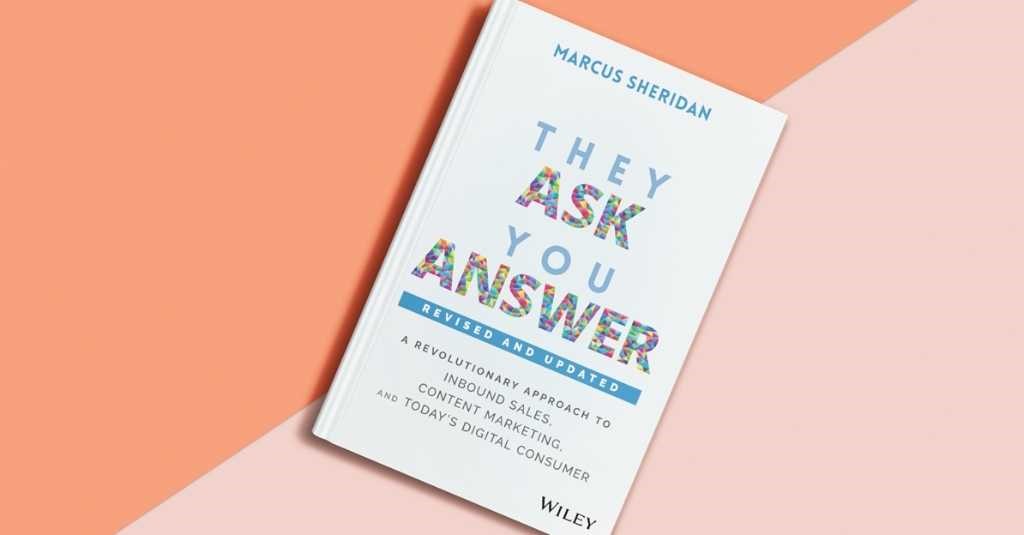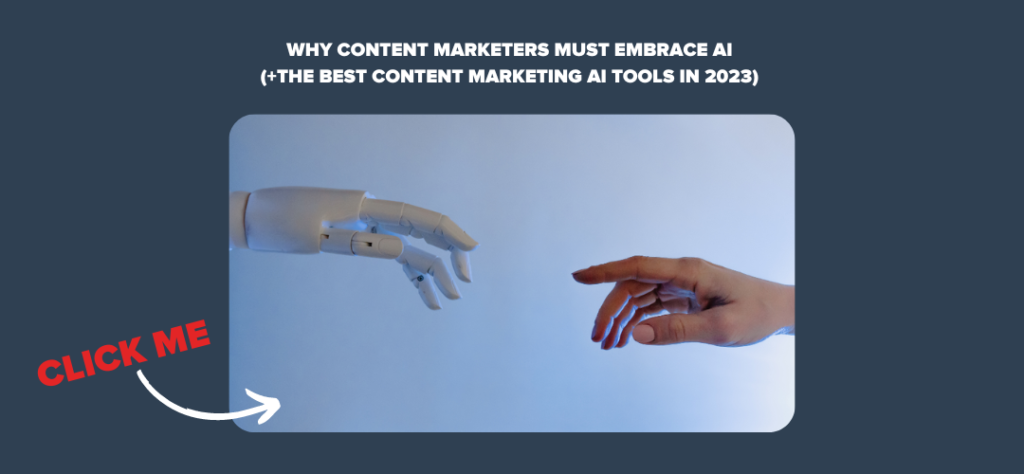Stop me if you’ve heard this before: You spend hours crafting the perfect email, only to watch your open rates stagnate and your click-through rates barely move the needle. You know your audience is out there, but reaching them seems harder than ever. Worse yet, managing your email list feels like a full-time job, and trying to add personalisation to the mix? That feels impossible.
Here’s the good news: Artificial intelligence (AI) can change the way you do email marketing—and not in a “robots take over your job” kind of way.
AI is about making your job easier, saving you time, and most importantly, helping you reach your audience more effectively.
Whether it’s segmenting your audience, personalising your messages, or even automating repetitive tasks, AI can transform your email marketing strategy into a well-oiled machine that runs smoothly while you focus on the big picture.
In this article, you’ll learn how to use AI to level up your email marketing efforts. From personalisation at scale to using tools like ChatGPT for crafting engaging content, we’ll walk through practical, easy-to-implement strategies to start seeing better results—without losing the human touch that makes your brand stand out.
What is Email Marketing?

Email marketing is the backbone of many digital marketing strategies.
At its core, email marketing is the use of email to promote your products or services, build relationships with potential customers, and keep existing ones engaged.
Unlike other forms of marketing, email marketing allows you to speak directly to your audience, making it one of the most personal and effective channels available.
But it’s not just about sending newsletters. Today, email marketing encompasses a wide range of activities:
- Promotional campaigns to drive sales and conversions
- Nurturing leads through targeted drip campaigns
- Customer retention by sending personalised offers and updates
- Brand storytelling to keep your audience connected and engaged
Read: Increasing Your Sales Revenue with Email Autoresponders
One of the biggest advantages of email marketing is its ability to reach people where they are—inside their inbox.
With over 347 billion active email users worldwide and an average ROI of $40 for every $1 spent, this channel remains one of the most reliable ways to connect with your audience.
Moreover, unlike social media, you own your email list, meaning you’re not at the mercy of algorithm changes or platform restrictions.
However, the landscape has become more competitive. Audiences are inundated with emails daily, making it tougher to stand out.
That’s where AI comes in.
Using artificial intelligence in email marketing not only makes it easier to personalise and automate, but it also helps you optimise your campaigns for better performance, ensuring that your message lands at the right time and in the right inbox.
Top Ways to Use AI in Email Marketing
AI is transforming email marketing by helping you do more with less. From personalising content to automating time-consuming tasks, here are the top ways AI can enhance your email marketing efforts:
1. Personalisation at Scale
Personalisation is key to successful email marketing, but doing it manually can be overwhelming—especially with a large email list.
AI takes personalisation to the next level by analysing customer behaviour, preferences, and past interactions to deliver highly relevant content.
For example, AI can recommend personalised product suggestions or create custom email copy based on the recipient’s interests. This level of personalisation leads to higher open and click-through rates because the emails feel tailor-made for each subscriber.
2. Automated List Segmentation
Segmenting your email list is crucial for delivering targeted messages, but it can be a tedious process.
AI automates list segmentation by analysing your audience’s behaviour and demographics in real-time. It groups subscribers based on their purchase history, engagement levels, and even predictive behaviours.
This ensures that each group receives content that resonates with them, whether it’s a new product launch or a special offer, without you having to manually sort through your data.
3. Predictive Analytics for Targeting
AI doesn’t just help you understand your audience—it can predict what they’ll do next.
Using predictive analytics, AI can forecast when a subscriber is most likely to engage, make a purchase, or churn.
This allows you to send emails at the optimal time for each user, increasing the chances of conversion. AI can also predict the lifetime value of a customer, helping you prioritise which segments to focus your efforts on.
4. Optimisation with A/B Testing
Testing different versions of an email to see what works best is a staple in email marketing, but manually A/B testing subject lines, content, and layouts can be time-consuming.
AI speeds up the process by automatically testing different elements of your email campaigns and learning from the results. It can identify what content, design, or subject line resonates best with your audience, optimising future campaigns for better engagement and higher conversions.
Summary of Top Ways to Use AI in Email Marketing
| AI Application | How It Helps | Key Benefits |
| Personalisation at Scale | AI analyses customer behaviour and preferences to create personalised email content. | Increases engagement with tailor-made emails. |
| Automated List Segmentation | AI automatically segments email lists based on customer behaviour, demographics, and engagement. | Saves time and ensures highly targeted messaging. |
| Predictive Analytics for Targeting | AI predicts future behaviours, like when subscribers are likely to engage or churn. | Optimises timing and focus for better conversion rates. |
| Optimisation with A/B Testing | AI automates and speeds up A/B testing, learning what works best for your audience. | Improves email performance by identifying high-engagement content. |
Best AI Tools to Use in Email Marketing
Below is a summary of the best AI tools to use for email marketing. You will be able to see more detail on each tool following this table.
| AI Tool | Key Features | Benefits of Tool | Limitations of Tool |
| Optimove | Predictive analytics, automated customer segmentation | Hyper-personalised email campaigns, data-driven insights | Higher learning curve for small businesses |
| SmartWriter AI | AI-generated personalised outreach emails, data from LinkedIn & Google Reviews | Increases engagement with tailored emails, automates outreach. In fact, they boast that they can help you generate 1000s of personalised emails that get you 8x more replies within minutes | Limited integrations, credit-based system limits usage |
| AI Subject Line Generator | Quickly generate subject lines based on the body of your email and the tone you select from the dropdown options | Optimises subject lines for higher open rates | Uses ChatGPT to produce these results, so you may get a better result by building a custom bot on ChatGPT |
| Rasa.io | AI-driven content curation, personalised newsletters | Customises content to user preferences, send time optimisation | Focuses mainly on newsletters, limited to content curation |
| Writersonic | AI-powered email content creation, supports multiple formats | Speeds up content creation, affordable pricing for small businesses | May produce generic content without detailed inputs |
| HubSpot Breeze AI | AI-powered email automation, personalised content generation within HubSpot CRM | Integrates deeply with HubSpot CRM, streamlines campaign creation | Requires HubSpot platform, advanced features may need CRM expertise |
Optimove
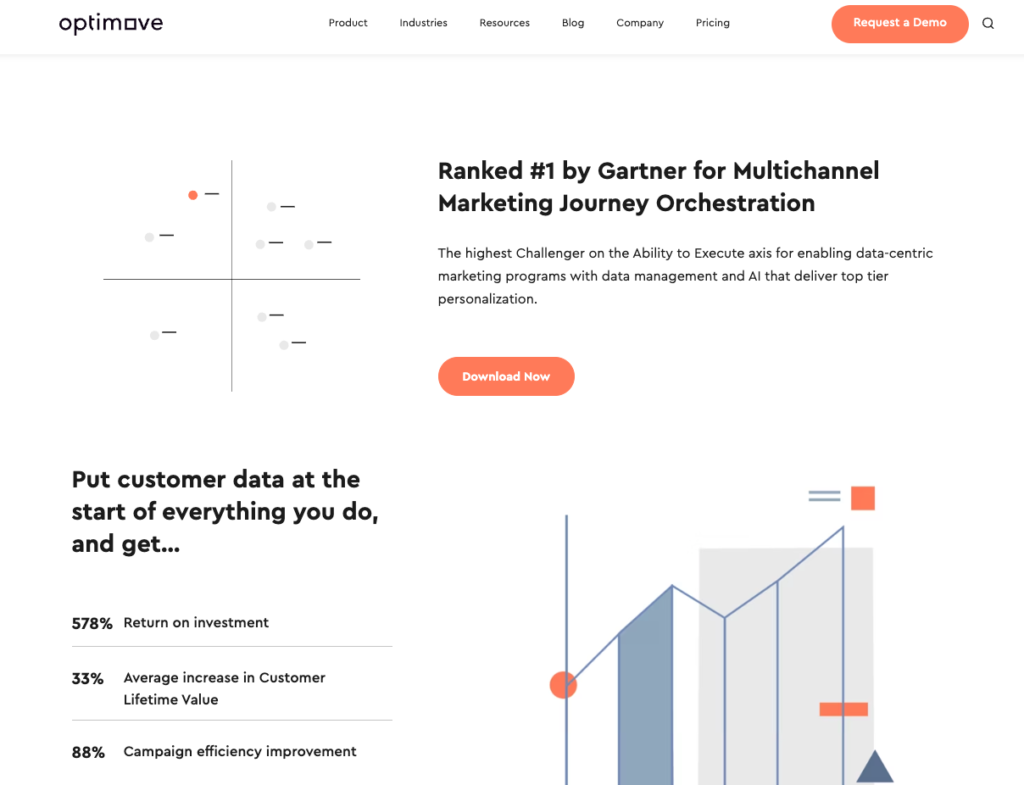
Optimove is an advanced CRM and marketing platform that leverages AI to provide hyper-personalised multichannel campaigns.
It enables businesses to automate email, SMS, and push notifications, using predictive analytics to segment customers and optimise engagement.
Optimove is especially useful for enterprises focused on customer retention and lifecycle marketing
Main Features:
- AI-powered customer segmentation and predictive analytics
- Multi-channel campaign automation (email, SMS, push notifications)
- Real-time customer data and personalisation tools
- A/B testing and ROI tracking
Pricing:
- Custom pricing based on active customers; typically starts at several thousand dollars per month depending on usage and customer base size
- Check out the pricing page here
Limitations:
- High learning curve for smaller businesses
- Expensive for startups or small teams
SmartWriter AI
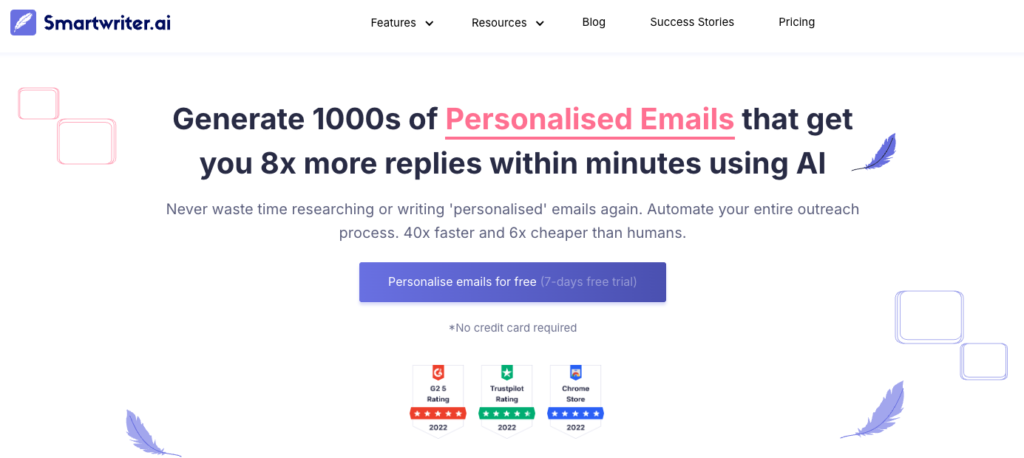
SmartWriter AI is a personalised outreach tool designed to automate email writing based on data from platforms like LinkedIn and Google Reviews.
By generating highly targeted email content, it helps businesses streamline lead generation and increase response rates. It integrates well with outreach platforms, allowing users to automate follow-ups and improve email engagement.
However, SmartWriter AI’s credit-based system and limited integrations can be restrictive for users managing high volumes of email campaigns.
Main Features:
- AI-generated personalised outreach emails (LinkedIn, Google Reviews integration)
- Automates lead generation and follow-ups with tailored messaging
Pricing:

- Basic plan: $49/month USD
- Popular Plan: $124/month USD
- Pro Plan: $299/month USD
Limitations:
- Limited third-party integrations
- Credit-based system limits usage for high-volume users
AI Subject Line Generator

AI Subject Line Generator is a simple tool that helps marketers craft optimised subject lines to improve email open rates. By analysing the content and context of your emails, it generates data-backed suggestions for subject lines to boost engagement.
While easy to use and effective for improving open rates, it lacks the deeper functionality of a full email platform, meaning you may want to think about using this with other tools.
In saying that, it’s free to use (as of 1st October 2024), so it might be worth checking out.
Rasa.io
Rasa.io is an AI-driven content curation platform designed to automate personalised newsletters. It pulls in relevant content based on user preferences and behaviours, ensuring each recipient gets tailored information.
Rasa.io is ideal for businesses and media outlets looking to boost engagement through automated newsletters.
While it excels in content curation, it has limited utility beyond newsletters, meaning companies needing more diverse content marketing solutions may find it restrictive.
Pricing
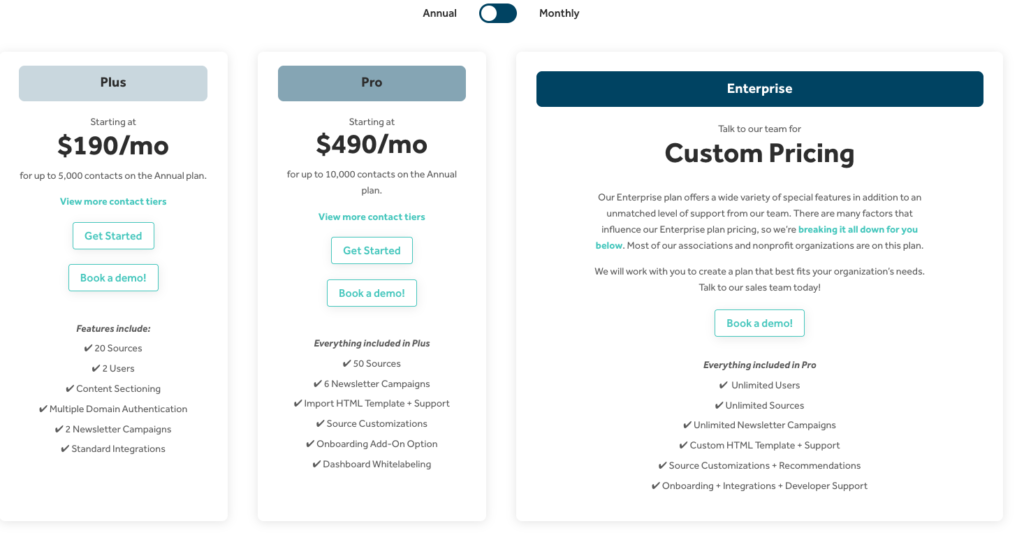
- Plus: $190/month USD
- Pro: $490/month USD
Writesonic
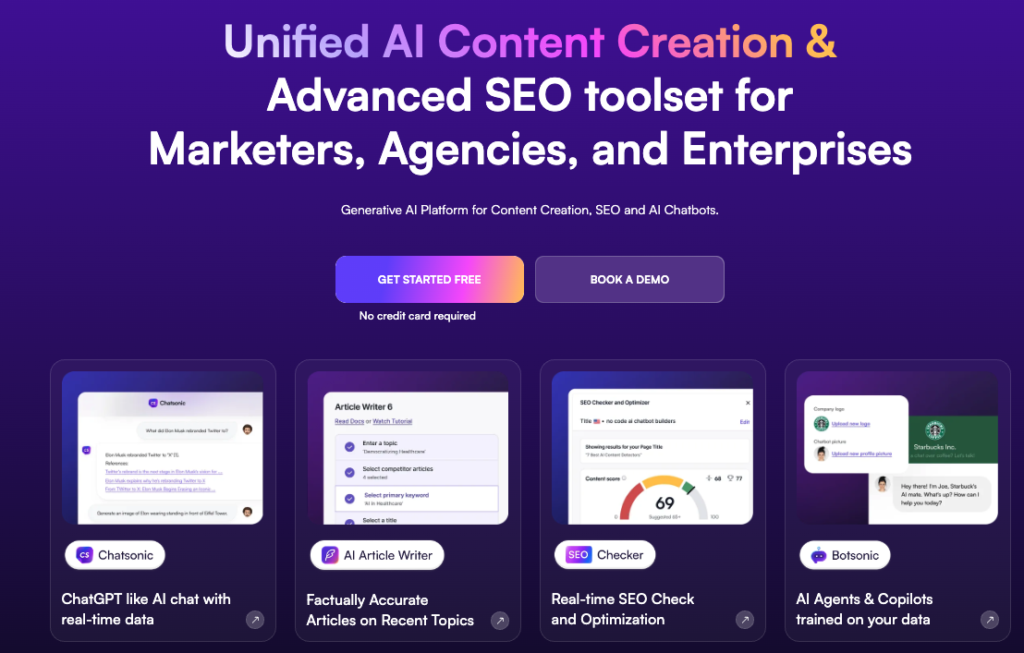
Writesonic is a versatile AI-powered content creation tool that supports a wide range of formats, including blogs, ads, and emails.
Its templates and AI-driven writing features allow users to generate content quickly, making it ideal for small businesses and marketers.
Main Features:
- AI article writer
- Get real-time, AI-generated SEO insights to optimise your content, improve your ranking on SERPs, and boost your website traffic
- Research any topic or subject, chat with any document, or summarise a webpage
- AI art generator
- Text to speech in 30+ languages
- Chatbots are available for separate pricing
Pricing:
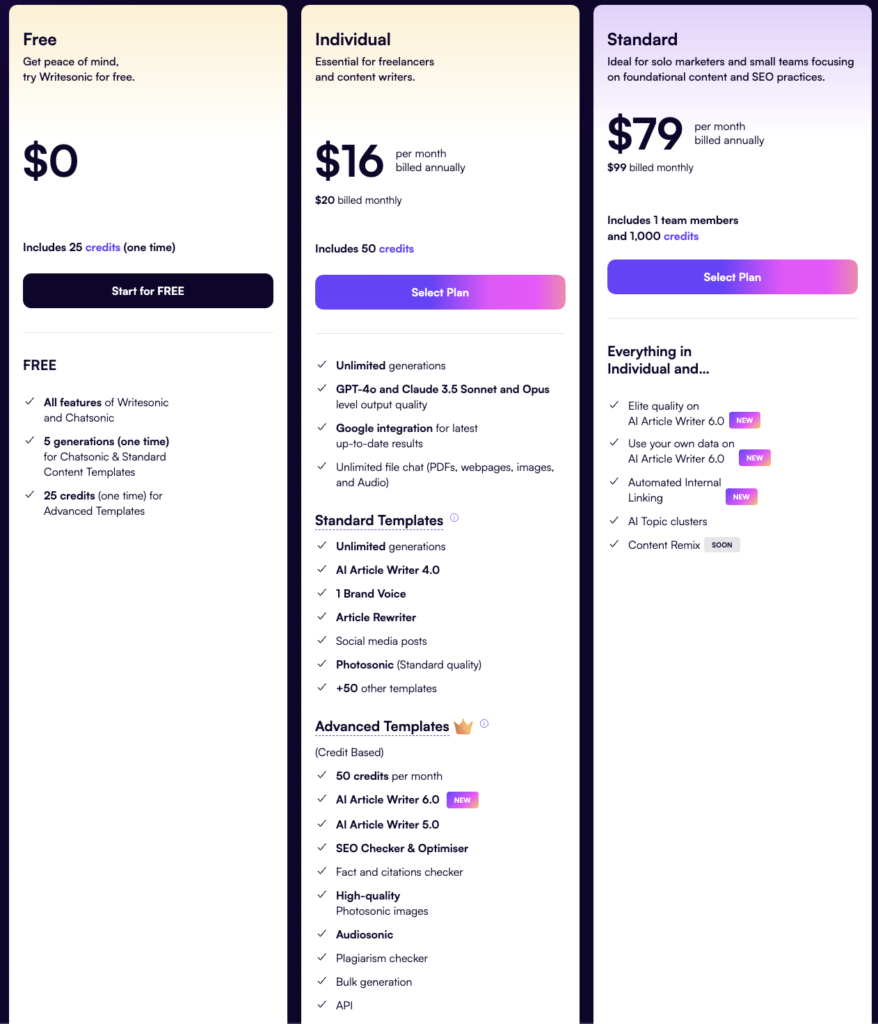
- Free Plan
- Individual Plan: $16 USD / month
- Standard Plan (better for teams): $79 USD / month
HubSpot Breeze AI
Breeze AI is HubSpot’s own AI tool, which is built to work seamlessly with HubSpot’s CRM, helping teams streamline their workflows and focus on what truly matters.
Main Features
| Component | Description | Example |
| Content Agent | Automates the creation of marketing materials such as blogs, podcasts, and landing pages. | You need a new podcast episode but don’t have time to script and record it. Breeze’s Content Agent writes a full script based on your topic and brand voice, and even records the episode using AI-generated voices |
| Social Media Agent | Automates social media content creation and scheduling, ensuring posts align with your brand voice. | Your social media manager is juggling too many platforms. The Social Media Agent automatically creates posts that reflect your company’s tone, schedules them during peak engagement times, and monitors performance, all without manual input |
| Prospecting Agent | Personalises outreach to leads by using CRM data to craft emails and follow-ups. | Instead of manually sending cold outreach emails, the Prospecting Agent analyses a prospect’s interaction with your website and creates a tailored follow-up email, increasing the chance of conversion |
| Customer Agent | Responds to customer inquiries automatically and escalates complex issues to human agents when necessary. | A customer asks a common question about your product’s features. The Customer Agent pulls from your knowledge base to answer instantly, but if the question requires deeper insight, it hands off the query to a human rep, providing all the context from the conversation |
| Breeze Intelligence | Breeze Intelligence enriches your customer data with over 200 million buyer profiles, helping your sales and marketing teams make more informed decisions. It also tracks buyer intent, identifying high-priority leads based on website behaviour and engagement signals. | For example, let’s say your sales team is struggling to find the right leads. Breeze Intelligence identifies companies showing high intent to purchase based on their interactions with your website and enriches your CRM with details like industry, revenue, and location. This allows your sales team to focus on the most promising opportunities. |
| HubSpot Copilot | Breeze Copilot is like having an AI-powered assistant at your fingertips. It works within HubSpot, in your browser, or even on mobile, helping you with tasks like content creation, customer research, and summarising customer service tickets. | Let’s say your marketing team is behind on creating a blog post. With a quick prompt, Breeze Copilot drafts an entire blog post based on previous content and your brand’s tone of voice. |
To find out more about HubSpot Breeze AI, check out our full guide here.
So, What’s Next?
There’s a lot of information in this article, and one thing we don’t want is to be bogged down by shiny object syndrome.
Start small by incorporating just one of these AI tools into your email marketing strategy. After using just one tool for a month, then bring the next into your arsenal, and so on. This approach will ensure you’re using each tool to its fullest capacity and prevent you from jumping around from tool to tool without seeing progress.
Next, find out about the best content marketing AI tools to use.

